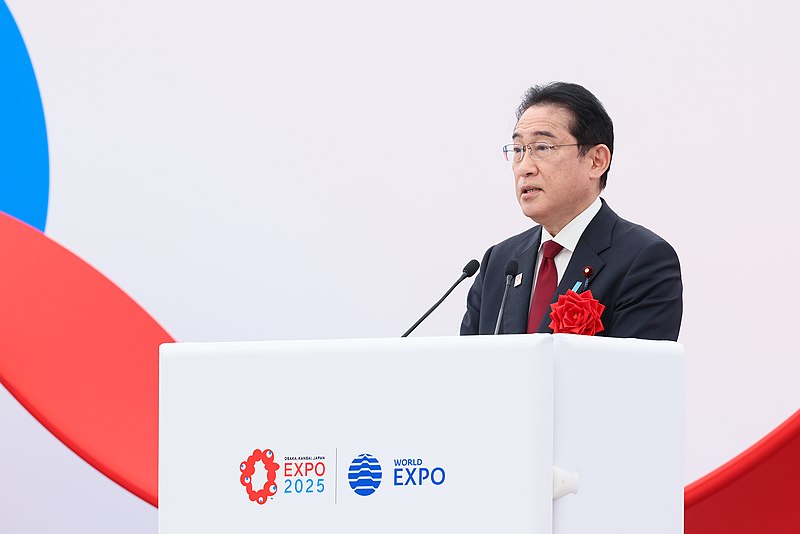Japanese Prime Minister Fumio Kishida said his country would continue to call on China to act responsibly on the world stage. This highlights Tokyo’s increasing concerns over the situation surrounding Taiwan and the Taiwan Strait.
Kishida told members of the media during a roundtable interview on Thursday that Japan will continue calling on China to act more responsibly as a major power on the world stage. Kishida also stressed the importance of peace and stability in the Taiwan Strait to the international community as a whole. This marks the latest indication of Japan’s increasing concerns over the waterway and the island nation which China claims as its territories.
“Peace and stability in the Taiwan Strait is not just important for Japan, but the international community and the world more broadly as well,” said Kishida.
“We have been consistent with our position on Taiwan that any issues should be resolved peacefully through dialogue. In any case…we will comply with our constitution, international laws, and domestic laws including the relevant defense laws,” said Kishida.
China views Taiwan as its territory ad has not ruled out using military force to take control of the island and its democratic government. Taiwan has repeatedly rejected Beijing’s claims, saying that only the Taiwanese people can decide the island’s future. Kishida’s comments follow recent Chinese military drills in the waters close to Taiwan earlier this month.
Kishida’s comments also follow the recent meeting of foreign ministers of the G7 countries in Japan this week. The group called on China to refrain from “threats, coercion intimidation, and use of force.”
Earlier this week, Japan also participated in joint military exercises with the United States and South Korea in light of the rising threats coming from North Korea with its nuclear and missile programs. The drills followed talks in Washington last week between the defense and diplomatic officials of the three allies, where they agreed to regularly hold regular missile defense and anti-submarine exercises in an effort to boost diplomatic and military cooperation.
Pyongyang has maintained that its nuclear and missile programs are a self-defensive measure against threats posed by the US while accusing Washington of escalating regional tensions with drills simulating an all-out military conflict with North Korea.



 Japan Election 2026: Sanae Takaichi Poised for Landslide Win Despite Record Snowfall
Japan Election 2026: Sanae Takaichi Poised for Landslide Win Despite Record Snowfall  Netanyahu to Meet Trump in Washington as Iran Nuclear Talks Intensify
Netanyahu to Meet Trump in Washington as Iran Nuclear Talks Intensify  Pentagon Ends Military Education Programs With Harvard University
Pentagon Ends Military Education Programs With Harvard University  Jack Lang Resigns as Head of Arab World Institute Amid Epstein Controversy
Jack Lang Resigns as Head of Arab World Institute Amid Epstein Controversy  Trump Signs Executive Order Threatening 25% Tariffs on Countries Trading With Iran
Trump Signs Executive Order Threatening 25% Tariffs on Countries Trading With Iran  U.S. Announces Additional $6 Million in Humanitarian Aid to Cuba Amid Oil Sanctions and Fuel Shortages
U.S. Announces Additional $6 Million in Humanitarian Aid to Cuba Amid Oil Sanctions and Fuel Shortages  Norway Opens Corruption Probe Into Former PM and Nobel Committee Chair Thorbjoern Jagland Over Epstein Links
Norway Opens Corruption Probe Into Former PM and Nobel Committee Chair Thorbjoern Jagland Over Epstein Links  U.S. to Begin Paying UN Dues as Financial Crisis Spurs Push for Reforms
U.S. to Begin Paying UN Dues as Financial Crisis Spurs Push for Reforms  Trump Lifts 25% Tariff on Indian Goods in Strategic U.S.–India Trade and Energy Deal
Trump Lifts 25% Tariff on Indian Goods in Strategic U.S.–India Trade and Energy Deal  New York Legalizes Medical Aid in Dying for Terminally Ill Patients
New York Legalizes Medical Aid in Dying for Terminally Ill Patients  U.S. Lawmakers to Review Unredacted Jeffrey Epstein DOJ Files Starting Monday
U.S. Lawmakers to Review Unredacted Jeffrey Epstein DOJ Files Starting Monday  Trump’s Inflation Claims Clash With Voters’ Cost-of-Living Reality
Trump’s Inflation Claims Clash With Voters’ Cost-of-Living Reality  TrumpRx Website Launches to Offer Discounted Prescription Drugs for Cash-Paying Americans
TrumpRx Website Launches to Offer Discounted Prescription Drugs for Cash-Paying Americans  Trump Endorses Japan’s Sanae Takaichi Ahead of Crucial Election Amid Market and China Tensions
Trump Endorses Japan’s Sanae Takaichi Ahead of Crucial Election Amid Market and China Tensions  Trump Allegedly Sought Airport, Penn Station Renaming in Exchange for Hudson River Tunnel Funding
Trump Allegedly Sought Airport, Penn Station Renaming in Exchange for Hudson River Tunnel Funding  Trump Allows Commercial Fishing in Protected New England Waters
Trump Allows Commercial Fishing in Protected New England Waters  Iran–U.S. Nuclear Talks in Oman Face Major Hurdles Amid Rising Regional Tensions
Iran–U.S. Nuclear Talks in Oman Face Major Hurdles Amid Rising Regional Tensions 































